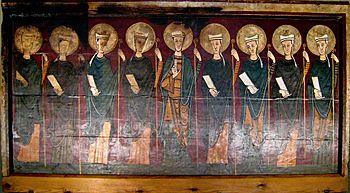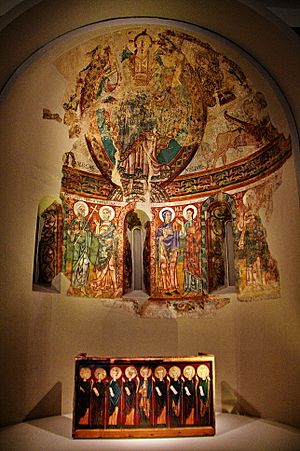Altar frontal from Tavèrnoles facts for kids
Quick facts for kids Altar frontal from Tavèrnoles |
|
|---|---|
 |
|
| Artist | Unknown |
| Year | Second half of 12th century |
| Medium | Tempera on wood |
| Dimensions | 120 cm × 218 cm (47 in × 86 in) |
| Location | Museu Nacional d'Art de Catalunya, Barcelona |
The Altar frontal from Tavèrnoles is a special piece of Romanesque art. It's a large front panel that used to decorate an altar in a church. You can see it today at the National Art Museum of Catalonia in Barcelona.
What is the Altar Frontal from Tavèrnoles?

This altar frontal from Sant Serni de Tavèrnoles is very special. It stands out because of its large size, how it's designed, and the people it shows.
It's much bigger than most other altar frontals from that time. Because of its size, some people thought it might have been a fancy coffin (a sarcophagus) or a large painting behind an altar (an altarpiece). But the monastery where it came from was very important. It held big church services that needed a large altar like this one.
The artwork shows nine holy bishops. The main figure in the middle is probably Saint Sernin. He was the special saint of the monastery. He was also a bishop who died for his faith in Toulouse.
This kind of picture is rare for paintings on wood panels. Usually, these paintings focus on one main person. Then they show other scenes or people in rows. The bishops on the sides, Martin and Bricius, are named by writing next to them. These parts were painted by a different artist.
What is the style of the artwork?
We don't know much about this altar's history. So, studying its style is our main way to learn about it. There are different ideas about its style.
The way the figures are drawn and how they repeat like a pattern makes some think it's like wall paintings (murals). But the careful lines used for the clothes (drapery) remind others of tiny, detailed book illustrations (miniatures).
It might have been made by artists connected to a place called La Seu d'Urgell. That's why it's displayed in the museum in a way that looks like the apse (the curved part at the end of a church) from La Seu d'Urgell.
See also
 In Spanish: Altar de Tavèrnoles para niños
In Spanish: Altar de Tavèrnoles para niños
- Apse from La Seu d'Urgell
 | Aaron Henry |
 | T. R. M. Howard |
 | Jesse Jackson |

